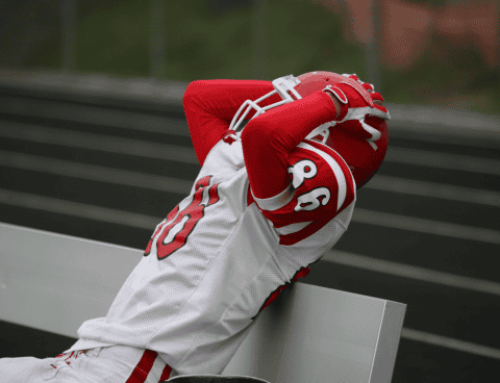Tips to Avoid Brain Drain and Mental Fatigue
For athletes, fatigue can set in from the extraordinary demands placed on emotional, physical and mental aspects of performance. In many ways, signs of physical fatigue are easier for athletes to identify and resolve. But what about mental aspects? What are symptoms of mental exhaustion? How can athletes combat “brain draining” and its performance-altering effects?
When it comes to mental training, learning how to take time off and allow yourself to recover is important. You don’t expect your body to work 24 hours a day, so why expect that from your mind?
“I’m not going to lie to you. I feel like the mental part is the biggest thing right now. It’s hard for me to take it easy and put my mind on something else during an off day. I’m so concerned about what I need to do to get better. I work as hard as I can between starts to the point where my mind gets tired. It’s too much, too much, too much.” — Jaime Garcia, St. Louis Cardinals P
Getting your mind to relax and recover can be extremely challenging for many athletes and, without consistent practice, the challenge is not easily overcome. The key to relaxing your mind: tell it what to think. Don’t tell yourself what you shouldn’t be thinking about (“I need to work on my swing” or “I might have a case of white-line fever“); be positive and proactive.
Let’s use Jaime Garcia as an example. He is thinking about all the factors he wants to improve, even on his days off. His mind is continually working, even through days of recovery. As a result, his mind isn’t able to recover enough to be at its peak for his next performance. If Garcia were able to focus on thoughts outside of baseball, he would give his mind a chance to recover and be ready for his next outing.
Often athletes find “cues” helpful in these situations. Depending on the athlete, the cue can be verbal, physical or visual. Regardless of the type, it should be powerful and personal. Use a cue when you find yourself thinking about your performance or game preparation on recovery days. It reminds you to relax and recharge.
For example, a verbal cue could be saying the word “calm.” A physical cue could be snapping a rubberband that you wear on your wrist, while a visual cue could be something you write on your hand. Find the type of cue that works best for you. Make sure it is personal and meaningful. Just be sure that you actually relax and recharge your mind!
There are many aspects of sport that you can’t control, so don’t let your mental game be one of them. Learning to focus and getting the most out of yourself mentally during a performance greatly hinges on your ability to allow for recovery. Your mind is a powerful asset to your performance; make sure you give it a chance to be at its peak and support you when you need it most.
“[St. Louis teammate Chris Carpenter] says every single year, there is going to be some kind of distraction. No matter if it’s your contract year or whatever. All you can do is take care of what you can control.” — Jaime Garcia
Photo: disciplesofuecker.com
Christine Rickertsen is a mental training consultant currently based in the San Francisco Bay Area. After receiving her master’s degree in sport psychology, she started a consulting business designed to help athletes. She’s had the opportunity to work with an increasingly diverse population of athletes and teams. Visit her website at selfmadeathlete.wordpress.com.
RECOMMENDED FOR YOU
MOST POPULAR
Tips to Avoid Brain Drain and Mental Fatigue
For athletes, fatigue can set in from the extraordinary demands placed on emotional, physical and mental aspects of performance. In many ways, signs of physical fatigue are easier for athletes to identify and resolve. But what about mental aspects? What are symptoms of mental exhaustion? How can athletes combat “brain draining” and its performance-altering effects?
When it comes to mental training, learning how to take time off and allow yourself to recover is important. You don’t expect your body to work 24 hours a day, so why expect that from your mind?
“I’m not going to lie to you. I feel like the mental part is the biggest thing right now. It’s hard for me to take it easy and put my mind on something else during an off day. I’m so concerned about what I need to do to get better. I work as hard as I can between starts to the point where my mind gets tired. It’s too much, too much, too much.” — Jaime Garcia, St. Louis Cardinals P
Getting your mind to relax and recover can be extremely challenging for many athletes and, without consistent practice, the challenge is not easily overcome. The key to relaxing your mind: tell it what to think. Don’t tell yourself what you shouldn’t be thinking about (“I need to work on my swing” or “I might have a case of white-line fever“); be positive and proactive.
Let’s use Jaime Garcia as an example. He is thinking about all the factors he wants to improve, even on his days off. His mind is continually working, even through days of recovery. As a result, his mind isn’t able to recover enough to be at its peak for his next performance. If Garcia were able to focus on thoughts outside of baseball, he would give his mind a chance to recover and be ready for his next outing.
Often athletes find “cues” helpful in these situations. Depending on the athlete, the cue can be verbal, physical or visual. Regardless of the type, it should be powerful and personal. Use a cue when you find yourself thinking about your performance or game preparation on recovery days. It reminds you to relax and recharge.
For example, a verbal cue could be saying the word “calm.” A physical cue could be snapping a rubberband that you wear on your wrist, while a visual cue could be something you write on your hand. Find the type of cue that works best for you. Make sure it is personal and meaningful. Just be sure that you actually relax and recharge your mind!
There are many aspects of sport that you can’t control, so don’t let your mental game be one of them. Learning to focus and getting the most out of yourself mentally during a performance greatly hinges on your ability to allow for recovery. Your mind is a powerful asset to your performance; make sure you give it a chance to be at its peak and support you when you need it most.
“[St. Louis teammate Chris Carpenter] says every single year, there is going to be some kind of distraction. No matter if it’s your contract year or whatever. All you can do is take care of what you can control.” — Jaime Garcia
Photo: disciplesofuecker.com
Christine Rickertsen is a mental training consultant currently based in the San Francisco Bay Area. After receiving her master’s degree in sport psychology, she started a consulting business designed to help athletes. She’s had the opportunity to work with an increasingly diverse population of athletes and teams. Visit her website at selfmadeathlete.wordpress.com.













